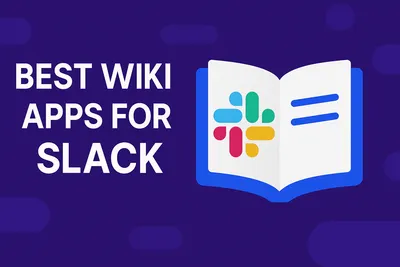
With remote and hybrid work now the norm, teams spend more time than ever in Slack - chatting, planning, and troubleshooting in real-time. But what happens when someone asks:
“Where’s that checklist?”
“What’s our process for onboarding?”
“Who owns this document?”
If your team’s knowledge is scattered across email threads, Google Docs, or forgotten PDFs, you’re not alone. That’s why a Slack-friendly wiki isn’t just a nice-to-have - it’s essential for operational clarity.
Below, we compare the top wiki apps for Slack in 2026, from fast-and-simple tools to full-featured platforms. Whether you're a lean startup or a growing enterprise, these apps help you make the most of your Slack environment.
1. Perfect Wiki
Perfect Wiki started as the go-to internal knowledge base for Microsoft Teams, known for its clean interface and zero learning curve. In 2026, it brings that same simplicity and power to Slack - offering a lightweight, fast wiki with built-in AI.
Why It Stands Out
- AI-powered Knowledge Bot: Ask “What’s our WFH policy?” in Slack, and get a direct, summarized answer from your wiki, built-in AI Knowledge Bot answers questions from your internal docs
- Smart Slash Commands: Query the knowledge bot or retrieve docs instantly using /pw [ask]. This way you will be able to quickly retrieve any piece of content from your knowledge base without even opening that. This feature is a great efficiency boost for any business, from customer support to financial teams.
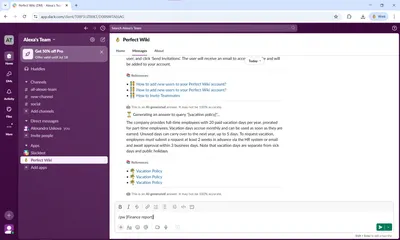
- Instant Sharing: Paste a wiki page link into Slack and get an automatic preview with title and summary. Easy and quick access to documents is what companies usually look for: employees can work independently with direct access to the required information
Zero Friction Setup: One-click installation, no separate login, and native permissions based on your Slack workspace. Perfect Wiki always strives to keep everything as simple as possible. Even a non-tech savvy team-lead will be able to add Perfect Wiki to Slack without facing any issues.
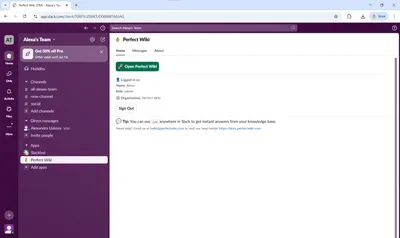
- Perfect for Microsoft Teams & Slack Environments: Use the same content across both platforms without duplication. Slack and Microsoft Teams are two workspaces that are used in most companies across the globe in different spheres. Having these two integrations at their disposal allows Perfect Wiki users to make knowledge sharing, retrieving and creating much more efficient.
- User-friendly Interface: Clean, distraction-free reader mode for SOPs and handbooks. Your users won't need months of onboarding courses to use the integration. It just lives in your Slack workspace making your internal knowledge accessible to anyone.
Pricing
Perfect Wiki is also a solution that can suit multiple teams in terms of pricing - the starting price for the subscription comes at a cost of USD 390 annually and allows to onboard 5 admin/editor users and 250 readers. That is a great value for many comparing with other competitors on the market. The full pricing structure can be found here: https://perfectwikiforteams.com/pricing
Conclusion
Perfect Wiki is an absolute game-changer for any team that needs to structure internal documents, speed up the Q&A process and improve content accessibility for the team members. With the Slack integration - your internal knowledge will be at hand at any time exactly where your team is working.
2. Guru
Guru is a knowledge management tool used widely in customer-facing teams. It’s built around the idea of knowledge cards - short, verified snippets of information - that are easy to pull up during live conversations.
Key Slack Features
Slash commands and message actions: Quickly find and insert knowledge cards in any thread.
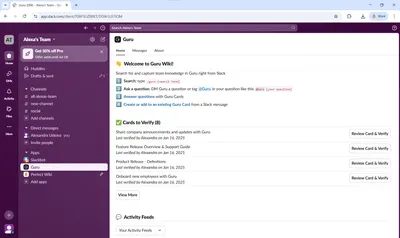
Auto-suggestions: Guru can suggest relevant cards in Slack based on conversations.
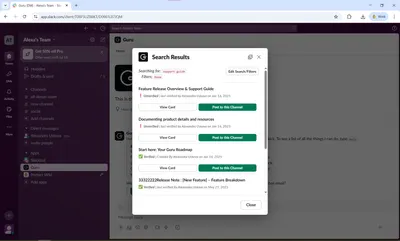
- Card verification: Helps ensure information stays up to date and trusted.
Limitations
- Steep learning curve for setup and card management
- Can get expensive for larger teams
- Not ideal for long-form documentation (more "snippets" than "pages")
Pricing
Higher-end and only viable when utilizing all its features, this tool may be too costly even for midsize companies to adopt as their initial entry into the knowledge base app market. The subscription starts at USD 18 monthly a user. All pricing details can be found here: https://www.getguru.com/pricing
Conclusion
Guru is excellent if you need just-in-time knowledge delivery, especially for customer support, sales enablement, and onboarding. However, its feature set may feel heavy or expensive for small, non-enterprise teams.
3. Notion
Notion isn’t a traditional wiki, but its flexibility makes it one of the most popular internal documentation tools out there. With support for databases, pages, and embeds, you can build robust internal knowledge hubs with a few clicks.
How It Connects with Slack
- Send updates and page previews to Slack channels
- Share Notion pages with automatic formatting and preview
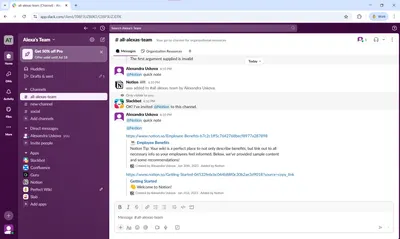
Limited support for Slack-based search or queries
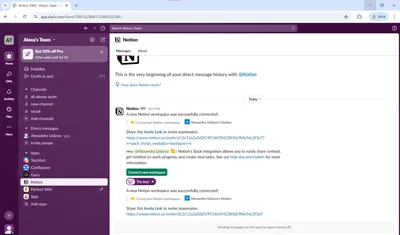
Limitations
- No in-Slack search or slash commands
- Slack integration is limited to notifications and link previews
- Can feel overwhelming for non-technical users without training
Pricing
Notion paid plans start at USD 10/user/month. While affordable, features like advanced permissions, SSO, and admin controls are locked behind higher tiers, which may limit usability for growing teams on a budget. Find out more details here: https://www.notion.com/pricing
Conclusion
While Notion’s Slack integration is notification-focused, it doesn’t support live querying or slash commands. Still, it works great if your team already lives in Notion and just needs to post updates into Slack.
4. Slab
Slab is a streamlined knowledge base built to feel like a modern publishing tool. It’s ideal for companies who need clarity, organization, and ease of use without overcomplication.
Slack Features Include
Slash commands to search and insert content
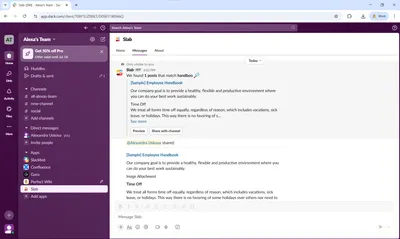
Automatic previews when sharing links
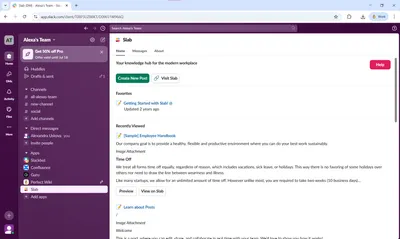
- Easy-to-read, distraction-free article layout
- Suggestions based on Slack messages (with integration)
Limitations
- Limited AI functionality
- More suited for structured documentation than real-time knowledge sharing
- Pricing scales quickly with team size
Pricing
Slab offers paid subscription starts at USD 8/user/month, and a Business plan at USD 15/user/month with advanced features like permissions and analytics. Overall, it’s a flexible, scalable option for teams of all sizes. Find more here: https://slab.com/pricing/
Conclusion
Slab is a fit for startups, product teams, and growing companies who value clean UX and fast knowledge sharing - with enough structure to scale over time. However, the lack of AI features and the pricing can become a show-stopper for smaller teams that require a knowledge base app to manage their content through Slack
5. Confluence by Atlassian
Confluence is the heavyweight representative of corporate wikis, especially for technical and enterprise-level teams. It integrates with Jira, Trello, and other Atlassian tools - making it powerful, but not always beginner-friendly.
What It Offers in Slack
Search and preview pages using /confluence commands
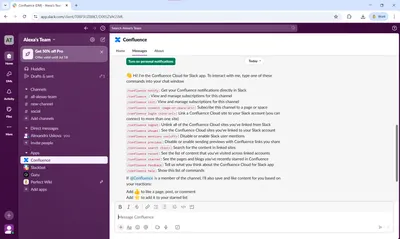
- Link sharing with smart previews
- Notifications for page changes, comments, and tasks
- Limited AI or content automation compared to newer tools
Limitations
- Slack integration is limited (basic search and link previews only)
- Feels clunky or outdated for non-technical users
- Higher complexity = longer onboarding and setup time
- High pricing
Pricing
Confluence is a robust solution suitable for larger business. The pricing structure isn't user-friendly at all. The starting point is about USD 5 per-user monthly, but as your team grows and if you want more advanced features - you have to switch to a more expensive plan. Find more details here: https://www.atlassian.com/software/confluence/pricing
Conclusion
Confluence is ideal if you already use Atlassian tools or have complex workflows requiring advanced permissions, content lifecycle management, or deep integrations with dev teams. Nevertheless, the main issue with Confluence is always the same - setup and maintenance difficulties and high pricing scale. Your team should have an IT/tech team to manage the knowledge base, setup integrations and keep everything accurate and up-to-date. Not every team has such an opportunity at hand.
Comparison table
| App | Pros | Cons | Starting Price | Best For |
|---|---|---|---|---|
| Perfect Wiki |
| USD 390/year (5 editors + 250 readers) | Any businesses, mainly those using both Slack & Microsoft Teams who need a clean, fast internal wiki | |
| Guru |
|
| USD 18/user/month | Sales, support, and onboarding teams needing quick reference |
| Notion |
|
| USD 10/user/month | Teams already using Notion for docs and projects |
| Slab |
|
| USD 8/user/month | Startups and growing teams needing structured internal docs |
| Confluence |
|
| USD 5/user/month -Higher for full feature set | Enterprises and technical teams already using Atlassian tools |
Final Thoughts: What’s the Best Wiki App for Slack in 2026?
As Slack becomes the command center for modern teams, choosing the right wiki app can transform how your organization captures, shares, and retrieves knowledge. Whether you need fast AI-powered answers, beautifully structured documentation, or seamless collaboration across tools, there’s a solution tailored to your workflow.
If you're looking for a lightweight, intuitive option with deep Slack (and Microsoft Teams) integration, Perfect Wiki is a top contender in 2026. But whichever tool you choose, the key is adopting a solution your whole team will actually use - every day, inside Slack, where the real work happens.
